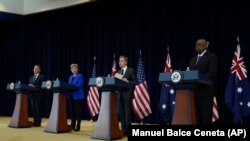U.S. Secretary of Defense Lloyd Austin called the relationship between the United States and Australia “an unbreakable alliance,” following meetings with U.S. Secretary of State Antony Blinken, Australian Foreign Minister Penny Wong, and Australian Deputy Prime Minister and Minister for Defense Richard Marles. “Australia and the United States,” noted Secretary Austin, “have stood shoulder to shoulder in every major conflict for more than a century.”
“The bond between our democracies and our peoples have been forged by shared sacrifice, shared values, and shared history. And as we look to the future, those bonds are stronger than they’ve ever been,” he said.
The U.S. and Australia share a vision of a region where countries can determine their own futures and should be able to seek security and prosperity free from coercion and intimidation, said Secretary Austin:
“Unfortunately, that vision is being challenged today. China’s dangerous and coercive actions throughout the Indo-Pacific, including around Taiwan, and toward the Pacific Island countries and in the East and South China Seas threaten regional peace and stability.”
Meanwhile, Russia’s cruel and unprovoked war against Ukraine is an attack on the rules-based international order that helps keep countries everywhere more secure.
In the face of global challenges, the United States and Australia agreed to deepen their defense cooperation by increasing the rotational presence of U.S. forces in Australia. That includes rotations of bomber task forces, fighters, and future rotations of U.S. Navy and U.S. Army capabilities.
The U.S. and Australia agreed to expand their logistics and sustainment cooperation, which will deepen their “interoperability and create more agile and resilient capabilities,” explained Secretary Austin. “We’ll also continue to find ways to further integrate our defense industrial bases in the years ahead. And we agreed to enhance trilateral defense cooperation and to invite Japan to integrate into our force posture initiatives in Australia.”
“These efforts don’t just demonstrate the closeness of our alliance,” declared Secretary Austin, “they also show the work that we’re doing together to deliver tangible results toward our common vision. I’m proud of what we’ve accomplished, and I’m excited about what we’ll get done together in the near future.”
Further, the U.S.-Australia Alliance and partnership extends far beyond defense and security: The two countries are committed to deepening their cooperation to strengthen and reform the multilateral system and galvanize collective action to address the climate crisis; protect and promote human rights and fundamental freedoms, democracy, and gender equity and equality; and advance the rules of the road for technology, cyberspace, trade, and commerce.






